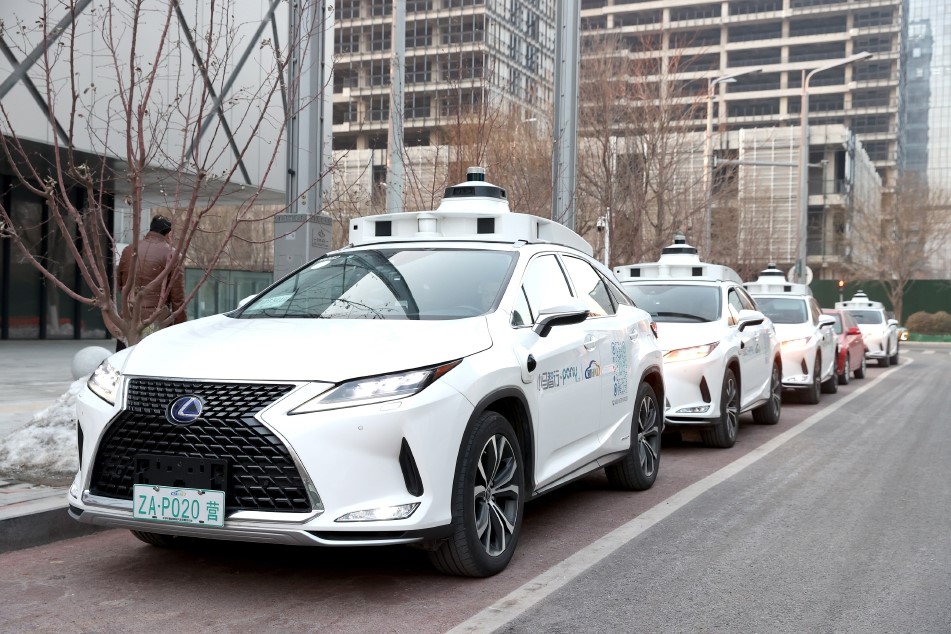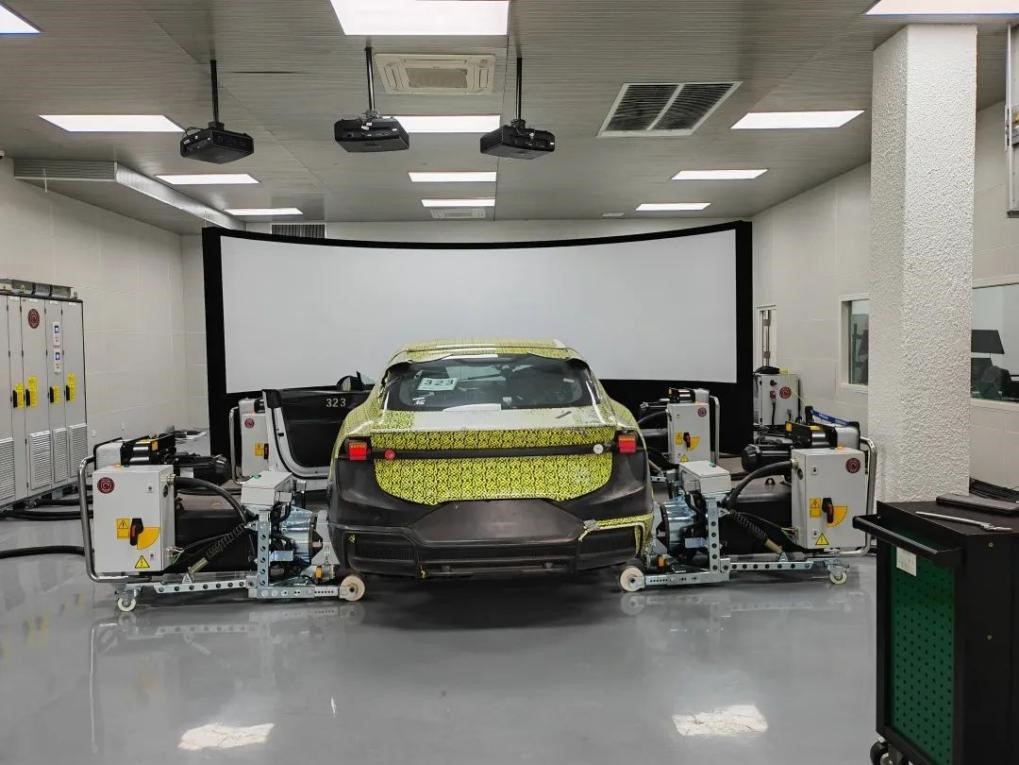Beijing makes big strides in integrated vehicle-road-cloud solution
In recent years, autonomous driving scenarios have become increasingly common in Beijing, the capital of China, especially in the Beijing High-Level Autonomous Driving Demonstration Zone located in the city's Economic-Technological Development Area, or Beijing E-town.
If you go to E-town from the Beijing Daxing International Airport, autonomous cabs are at your service. If you are on a visit to the Beijing Municipal Administrative Center, you can take self-driving buses for a tour. The streets of the city, which are spick-and-span every morning, are also cleaned by autopilot sanitation vehicles at midnight.

Photo shows autonomous vehicles on a street of Beijing Economic-Technological Development Area. (Photo/Wu Jiang)
In the Beijing High-Level Autonomous Driving Demonstration Zone, more than 800 autonomous driving vehicles manufactured by 29 automakers have obtained the approval for road testing. The testing mileage of these vehicles has totaled nearly 30 million kilometers.
Such achievements are inseparable from the National Innovation Center of Intelligent and Connected Vehicles (CICV) located in E-town.
At the Taiheqiao base of the CICV, People's Daily journalists boarded a test vehicle. A safety supervisor in the driver's seat took his hands off the steering wheel, and then the vehicle performed a series of tasks including accelerating, decelerating, turning, overtaking and lane changing.
The ride was impressively smooth and the vehicle surprisingly intelligent. Even when some of the traffic markings on parts of the road were blurred, the vehicle could still operate "by the book"; when a pedestrian suddenly appeared on the zebra crossing in front of the vehicle, the vehicle didn't "panic," but decelerated smoothly after its laser radar detected the pedestrian.
"To develop intelligent and connected vehicles, we need to integrate vehicles, roads, big data and cloud computing technologies into one system, so that we can better achieve intelligent mobility. This is the integrated vehicle-road-cloud solution we have been exploring," said Zheng Jihu, executive vice director of the CICV.
On the test roads for autonomous driving in E-town, when traffic congestion happens at an intersection 500 meters ahead, intelligent traffic light poles will quickly upload relevant information to the cloud. The cloud then transmits this to intelligent connected vehicles, telling them to promptly find a smoother route.
The demonstration zone is equipped with roadside sensors, intelligent traffic signal control systems, and vehicle-to-infrastructure communication systems. It enables comprehensive connectivity between vehicles and road infrastructure, as well as vehicle-to-vehicle connectivity, facilitated by laser radars, millimeter-wave radars, and AI cameras.
"Through the deep integration of vehicles, road infrastructure, and cloud computing platforms, we effectively solve the problems of information asymmetry and lack of coordination in traditional traffic systems, significantly improving the safety, efficiency, and comfort of the transportation system," said Zheng.
At the end of February this year, under the guidance of the CICV, a demonstration route for the application of intelligent and connected vehicles was opened, connecting the Baodi Station of the Beijing-Tangshan Intercity Railway and the Beijing-Tianjin Zhongguancun Tech Town. The 11.3 km road has a designed maximum speed of 70 km/h, with a one-way trip taking only 18 minutes at the fastest.
The demonstration route adopts a vehicle-road-cloud integrated solution, which enables intelligent and connected buses running on it to respond promptly to emergencies, detect pedestrians and vehicles, automatically decelerate to avoid collisions, and automatically stop at stations, said Tang Fengmin, an executive of the CICV.

A vehicle is tested in an in-the-loop laboratory of the National Innovation Center of Intelligent and Connected Vehicles in Beijing. (Photo from the official website of Beijing Economic-Technological Development Area)
According to Tang, one-way travel time has been reduced by 47 percent. This provides support for subsequent expansion and connection to more application scenarios.
Currently, the CICV is equipped with 22 professional laboratories and a trial production center. These laboratories are able to test whether an autonomous driving vehicle is able to "see" and "hear."
In an in-the-loop laboratory of the CICV, a newly launched self-driving car appears stationary but has already "driven" tens of thousands of kilometers during several months of testing.
A test vehicle on a vehicle test bed is similar to a person running on a treadmill wearing a virtual reality headset, as simulated road environments are shown on a large screen.
Tests that would take two to three weeks on real roads can be compressed into just one to two days on the test bed. The CICV has collected over 1 million real-world scenarios nationwide, allowing test vehicles to adapt to all situations.
Unlike traditional vehicles, which primarily focus on real-world road testing for their dynamic performance, testing for intelligent and connected vehicles is mainly done through digital modeling. This requires a rich scenario library to enable the testing and verification of algorithms for driving perception, decision planning, and intelligent control.
The CICV has established a leading domestic scenario database for intelligent and connected vehicles, a virtual vehicle and human-machine interaction testing environment, and a wireless communication testing environment for complete vehicles. This can support full-scenario testing and application services from virtual simulation to real vehicle verification during the entire vehicle development process, potentially saving 70 percent of research and development costs for enterprises.
Utilizing the platforms it has built, the CICV is actively promoting and formulating relevant standard systems.
"Information security and communication security are prerequisites for the application of intelligent and connected vehicles, but there has always been a lack of unified standards and clear norms. The CICV has released a series of standards, providing a basis and direction for the information security testing of our products," said Xiao Ping, product manager of truck business at Pony.ai, an autonomous vehicle technology company.
In recent years, the CICV has released more than 20 standards to facilitate the construction of an integrated vehicle-road-cloud standard system.
Photos
Related Stories
- China to further promote intelligent manufacturing
- 2022 World Intelligent Connected Vehicles Conference kicks off in Beijing
- Professional farmers in SW China make spring farming intelligent
- Intelligent transformation gives a boost to manufacturing sector in Zhejiang's Xinchang county
- Test in intelligent vehicle for food detection conducted in Lanzhou (3)
Copyright © 2024 People's Daily Online. All Rights Reserved.









